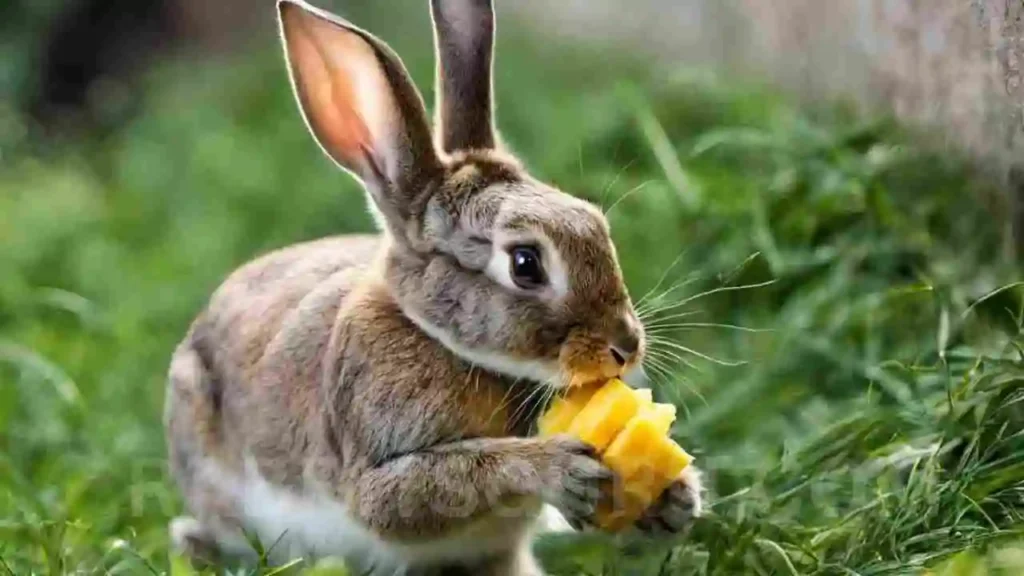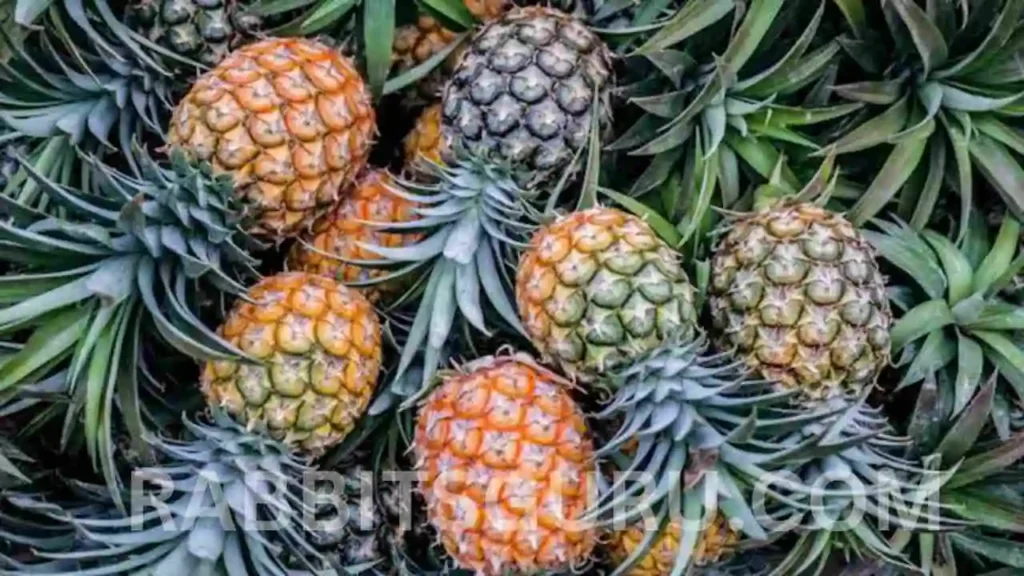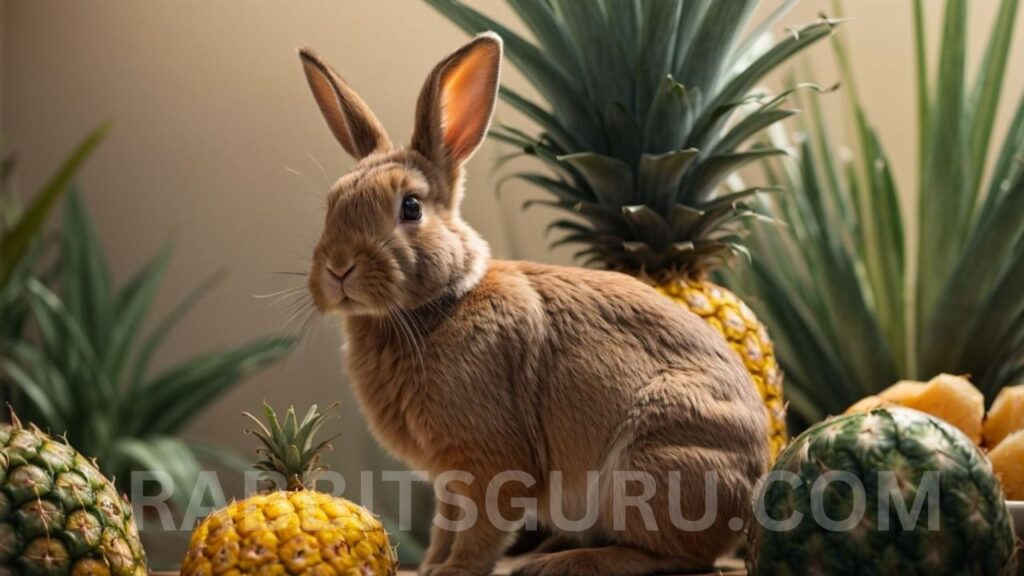Can Rabbits Eat Pineapples?
Pineapples can be fed to rabbits, but in moderation due to their high sugar content and acidity. While pineapples offer beneficial nutrients like vitamin C and fiber, which can support rabbit health and digestion, excessive consumption may lead to gastrointestinal issues, mouth sores, or indigestion.
Although rabbits can eat pineapples, it’s important to consider their overall health and well-being. Pineapples are rich in vitamin C, fiber, and bromelain, an enzyme that aids protein digestion. However, their high sugar content means they should be given sparingly to prevent obesity and digestive issues such as diarrhea or upset stomach.
Can Rabbits Eat Pineapples?

When introducing pineapples to your rabbit’s diet, begin with small pieces to observe how they digest it, and always remove the tough outer skin and pits.
Rabbits can enjoy pineapples as an occasional treat, but it’s crucial to offer them cautiously to maintain their health. Pineapples are rich in vitamin C, fiber, and bromelain enzyme, all beneficial for rabbits. However, their high sugar and acidity levels can lead to obesity and mouth sores if consumed excessively.
Pineapples should be fed sparingly, comprising no more than 5% of the rabbit’s diet. Grass, providing essential fiber, along with a variety of fresh vegetables and a limited amount of high-quality pellets, should form the primary components of their diet to ensure a balanced nutrition.
While pineapples can be a tasty and nutritious addition to a rabbit’s diet, moderation and careful feeding are key to preventing potential health issues. This approach allows rabbits to enjoy the occasional sweet treat without compromising their overall health.
Are Pineapple Safe For Rabbits?
Pineapples can be a safe and healthy addition to a rabbit’s diet when given in moderation. They contain essential vitamins and minerals like vitamin C and manganese, which benefit the rabbit’s overall health.
However, their high sugar content means they should be offered sparingly to prevent digestive issues and obesity. It’s crucial to remove the tough outer skin and any seeds before feeding, as these parts can be harmful.
When offering pineapples to your rabbit, proper preparation is key. Start by thoroughly washing the fruit to remove any pesticides or chemicals. Peel off the outer skin and remove the hard core, as these can be difficult for rabbits to digest and pose a choking hazard. Cut the pineapple into small, manageable pieces to make it easier for your rabbit to eat.
Introduce pineapple gradually into your rabbit’s diet, starting with small portions to ensure they tolerate it well.
Can Rabbits Eat Pineapple Juice?

Rabbits can consume small amounts of pineapple juice, but this should be approached with caution and moderation due to its natural sugars and acids, which can be challenging for their digestive system if given excessively.
Ensure the juice is pure and does not contain added sugars or preservatives that could harm rabbits. Always introduce any new food gradually to watch for any negative reactions.
A safer alternative is to provide fiber-rich foods along with natural sugars. As always, a rabbit’s main diet should consist of grass, fresh vegetables, and a small amount of pellets to maintain their health.
Occasionally, a few drops of pineapple juice mixed with water can be offered as a treat. However, fresh pineapple, given in small amounts, is generally safer as it also provides natural sugars and fiber. It’s essential to start any new food or treat slowly and monitor the rabbit closely for any adverse effects.
Advantages Of Rabbits Pineapple To Eat?

An occasional serving of pineapple offers numerous health benefits due to its vitamin C and fiber content, but it should be given in moderation to prevent digestive issues. Introducing new foods slowly is advisable to monitor for any adverse reactions.
Rich in nutrients: Pineapple contains essential vitamins and minerals that are beneficial for a rabbit’s immune system.
High in fiber: Fiber is crucial for maintaining digestive health in rabbits, and pineapples provide soluble fiber that supports gut health.
Natural enzymes: Pineapple contains bromelain, an enzyme that aids in protein digestion, potentially benefiting rabbit digestion.
Hydration: With its high water content, pineapple can contribute to keeping rabbits hydrated.
Dietary diversity: Adding pineapple occasionally to a rabbit’s diet can diversify their nutritional intake, preventing boredom and encouraging consumption of other essential nutrients like grass.
Treat options is available: Pineapples can be offered to rabbits as a treat, adding enjoyment to their daily routine. Pineapple slices serve as a healthier alternative to highly sugary and processed foods for rabbits.
Also Read: Most Popular Rabbit Breeds
FAQs
Q1. How to give pineapple to rabbits?
Give pineapples in small amounts, ensuring they are fresh and cut into small pieces to facilitate easy eating.
Q2. Are there any precautions?
Introduce pineapple to rabbits slowly to prevent digestive upset, and monitor them closely for any adverse reactions.
Q3. What is the best feeding practice for rabbits?
Pineapple should be offered as an occasional treat rather than a primary food. It complements a balanced diet consisting of fresh green vegetables and pellets.
Q4. Can rabbits eat pineapple leaves or skin?
Rabbits cannot eat pineapple leaves or skin due to their toughness. Only give them the pineapple pulp without the leaves or skin, as these parts can be difficult for rabbits to digest.
Conclusion
Pineapple should be fed in moderation due to its high sugar content, requiring careful feeding practices. When introducing this fruit into a rabbit’s diet, it’s crucial to remove the tough core and skin to prevent any potential hazards and ensure the rabbit’s safety. Overall, incorporating pineapple in small quantities can diversify a rabbit’s diet when balanced with other nutritious foods.
